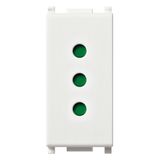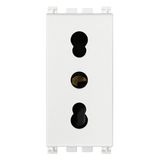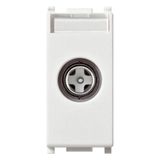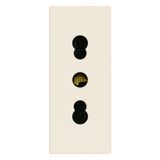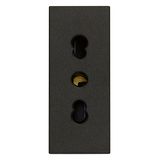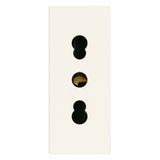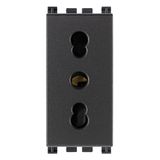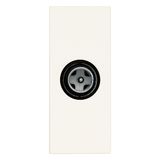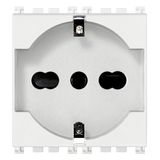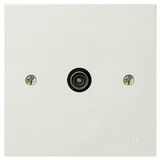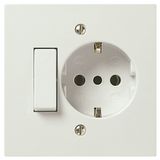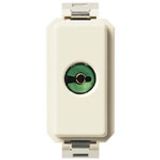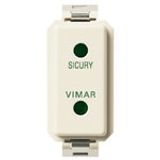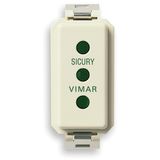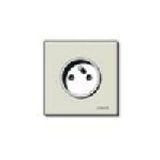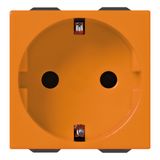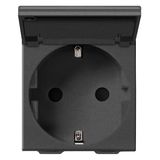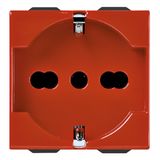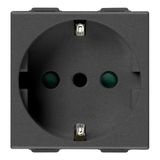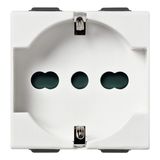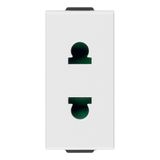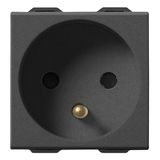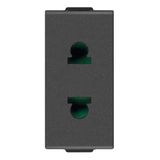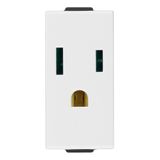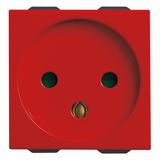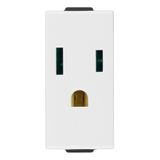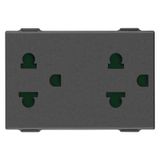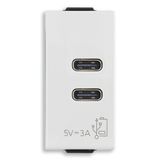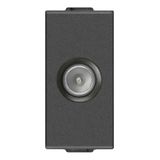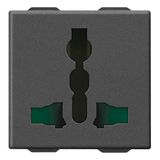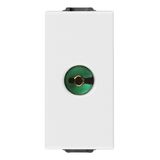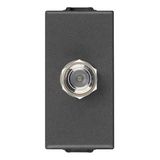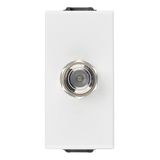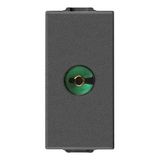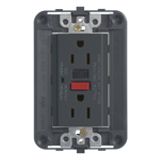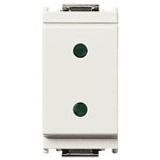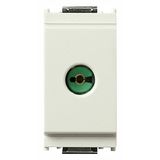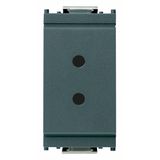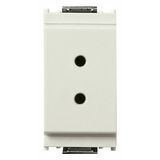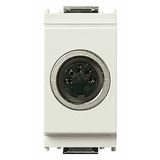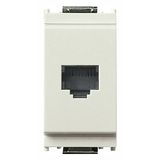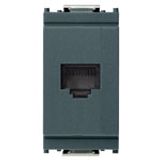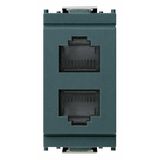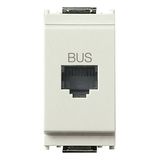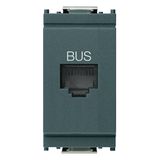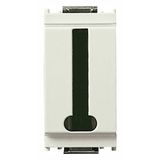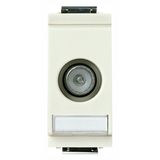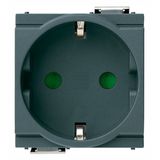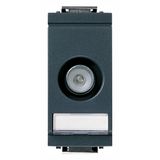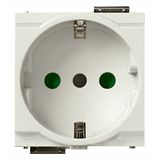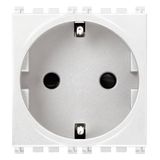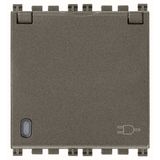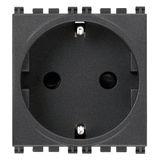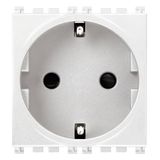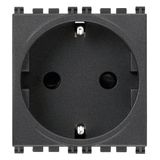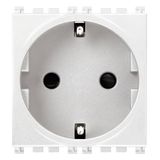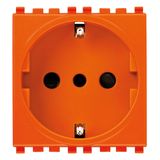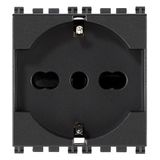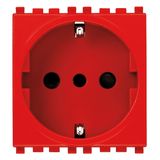Vimar Sockets
2P 10A P10 outlet
2P+E 10A P11 outlet
F-type TV outlet white
2P 10A outlet white
RJ12 phone jack 6/6 grey
BUS RJ11phone jack white
BUS RJ11phone jack grey
2P+E 16A P30 outlet red
Installers standardize on one geometry and clear labeling so outlets line up, sit flush, and survive maintenance. Vimar’s socket platform follows that logic: consistent 60 mm screw spacing, Ø68 mm drywall cutouts, 71 mm multi-gang pitch, and accessories that keep IP and segregation intact. Ratings, torque windows, and strip lengths are printed where crews need them—on the parts.
vimar sockets portfolio and voltage standards
The vimar sockets range spans single, double, and multi-gang inserts with shuttered fronts, USB-A/USB-C charge variants, and options for splash zones when used with gaskets and correct orientation. Core data for EU estates: 230 V systems, 16 A mechanisms, glow-wire 650/850 °C per model, and wiring windows of 0.5…2.5 mm² Cu with 8–10 mm strip.
vimar electrical sockets contact ratings and IP options
Where cleaning or dust is expected, gasket sets lift ingress to IP44 (confirm mounting position); IK classes are available for tougher corridors. AgSnO₂ contact sets handle mixed electronic loads cleanly, and terminals remain finger-safe under the cover. Maintenance teams catalogue vimar electrical sockets by IP/IK, finish, and gang count to keep swap-outs predictable.
vimar power outlets country formats and accessories
EU-type plates are offered alongside travel and data combinations, plus child-resistant shutters and label windows for circuit IDs. Faceplates in matte/gloss polymers and metals match front-of-house finishes; depth shims (2–10 mm) correct proud plaster so trims sit true. For stocking, tag vimar power outlets by finish code, accessory kit, and intended room class.
vimar wall socket mechanisms terminals and mounting
Screw or spring clamps accept ferruled conductors; recommended terminal torque is typically 0.4…0.8 Nm (device label prevails). Claw or screw fixing covers masonry and drywall boxes, with steady alignment on the 60 mm line. Crews prefer vimar wall socket mechanisms that keep test access after fit-off so IR and polarity checks don’t require plate removal.
vimar modular socket systems multi-gang layouts and finishes
Supports keep the 71/71/71 mm pitch for three-gang lines, with one visible outer line from single to five-gang. Data, TV/SAT, and USB modules share the grid, so mixed plates stay level without custom spacers. Designers select vimar modular socket systems to lock geometry once and mix inserts as room lists evolve.
vimar universal sockets mixed-plug estates and retrofit notes
Where estates carry varied appliances, combined apertures accept several plug geometries within one footprint (observe local approvals before using beyond public areas). Mark outlets clearly to avoid misuse, and document breaker/RCBO curves for portable-equipment inrush. Facilities list vimar universal sockets by area and rule set so the intent is unmistakable.
vimar plug and outlet components shutters, plates, and strain relief
Shutter modules, inscription windows, compression glands for surface boxes, and separation barriers for SELV/mains keep installations tidy and auditable. Repair collars rescue oversize cutouts; spacer rings align plates over tiling. Procurement groups vimar plug and outlet components with frames, supports, and gaskets to avoid ad-hoc fixes during handover nights.
Technical specifications and standards that matter
Supply 230 V AC, 50/60 Hz; 10/16 A mechanisms per insert; terminals 0.5…2.5 mm² Cu; strip 8–10 mm; torque 0.4…0.8 Nm (check label). Ingress IP20 standard rooms; IP44 with gasket sets when mounted as tested. Glow-wire 650–850 °C (IEC 60695-2-11). Compliance touchpoints: EN 60669-1 (mechanisms), EN 60670-1 (boxes/enclosures), IEC 60529 (IP). Keep SELV segregated with barriers; maintain bend radius for data where shared plates are used.
Applications and compatibility
Hotels and offices align multi-gang grids with matching finishes; housekeeping closets use gasketed sets; education and healthcare opt for tougher fronts and clear legends. All inserts sit on the same platform as the brand’s frames and supports, so geometry, torque, and strip rules carry across floors.
Selection criteria for B2B buyers
- Fix environment and duty: IP/IK class, cleaning agents, and child-safety shutters where required.
- Lock geometry early: gang plan, support type, and finish codes; include depth shims where walls vary.
- Define wiring practice: conductor size, ferrules, torque/strip lengths, and labeling windows.
- Specify add-ons: USB power, data/TV apertures, and segregation barriers for mixed plates.
- Publish test steps (IR, polarity, loop/Zs at the plate) so sign-offs don’t stall.
How Bankoflamps supports socket packages without friction
Bankoflamps issues tailored pricing per job, turns quotes around quickly by EAN/MPN, and shows live EU stock before rooms are released. The client portal lists current lead times, lets you download up-to-date price files with validity dates, and tracks shipments. Trusted accounts can operate with post-payment terms up to 30 days. Orders are consolidated so frames, supports, inserts, gaskets, barriers, and labels arrive bundled by level or riser, and an account manager checks gang plans, IP needs, segregation notes, torque/strip rules, and finish codes against your documents—keeping deliveries site-ready across France, the Baltics, Germany, Spain, Italy, Belgium, and the Netherlands.
